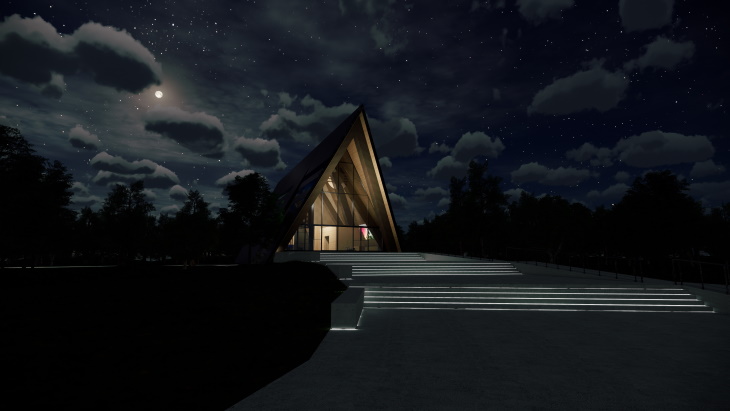Oklo awarded federal funding for Aurora fuel development
Oklo Inc has announced a USD2 million cost-share award from the US Department of Energy supported by the Technology Commercialisation Fund (TCF). Oklo is matching USD1 million in funds in a public-private partnership with the DOE and Argonne National Laboratory. The TCF project will enable the commercialisation of advanced fuel recycling capabilities by utilising electrorefining technology.

Oklo's Aurora powerhouse (Image: Genster)
The funds will be used in the application of advanced materials processing to enable direct production of fast reactor fuel alloys. California-based Oklo said the electrorefining process helps reduce fuel costs for advanced reactors.
"Thermal reactors access a fraction of the energy in fuel, while fast reactors coupled with electrorefining can unlock the remaining untapped energy in fuel while reducing the volume and radiological lifetime of the waste material," it said.
The award to Oklo was part of more than USD30 million in federal funding, matched by over USD35 million in private sector funds, announced by the DOE on 24 June. This TCF funding is for 68 projects that will accelerate the commercialisation of promising energy technologies - ranging from clean energy and advanced manufacturing, to building efficiency and next-generation materials.
"These awards will help deploy innovative solutions from DOE's National Labs onto the marketplace helping to create new jobs and businesses, while strengthening the nation's economic competitiveness and achieving President Biden's goal of net-zero carbon emissions by 2050," the DOE said.
"When your fuel is millions of times more energy-dense than alternatives, that's a key enabler to deliver the cheapest forms of clean power available to humanity," said Caroline Cochran, co-founder and COO of Oklo.
Jacob DeWitte, co-founder and CEO of Oklo, added: "The award showcases the DOE's priority to support the private sector in bringing next-generation fission to market."
Oklo's proposed Aurora reactor design is a fast neutron reactor that uses heat pipes to transport heat from the reactor core to a supercritical carbon dioxide power conversion system to generate electricity. Using metallic high-assay low-enriched uranium (HALEU) fuel, the Aurora 'powerhouse' produces about 1.5 MW of electric power, and can also produce usable heat. Idaho National Laboratory (INL) last year agreed to provide Oklo with access to HALEU fuel recovered from a now-decommissioned experimental reactor for use in the development and demonstration of Aurora.
Oklo has previously received federal funding for technology development through the DOE's cost-shared Gateway for Accelerated Innovation in Nuclear initiative. In December 2019, it received a site use permit from the DOE to build an Aurora plant at INL which is anticipated to be the first-of-a-kind deployment of the design. In March 2020, Oklo submitted a combined licence application to the US Nuclear Regulatory Commission (NRC) for the construction and operation of its Aurora reactor at the INL site. In June last year, it became the first such application for an advanced fission technology to be accepted for NRC review.
Researched and written by World Nuclear News
- China Institute of Atomic Energy
- Nuclear Power Institute of China
- Southwestern Institute of Physics
- China Nuclear Power Operation Technology Corporation, Ltd.
- China Nuclear Power Engineering Co., Ltd.
- China Institute for Radiation Protection
- Beijing Research Institute of Uranium Geology (BRIUG)
- China Institute of Nuclear Industry Strategy (CINIS)
- China Nuclear Mining Science and Technology Corporation


